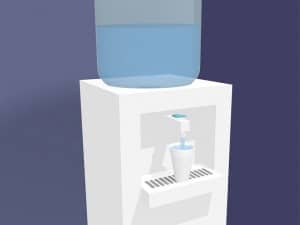 According to a 15-year French study entitled Aluminium and Silica in Drinking Water and the Risk of Alzheimer’s Disease or Cognitive Decline, conducted by the Division of Biostatistics, Unité 897, Institut National de la Santé et de la Recherche Médicale, Bordeaux, France and published in the American Journal of Epidemiology, on elderly men and women, regular consumption of tap water was associated with aluminium toxicity as well as increased incidence of dementia, suggesting that long-term tap water use could affect your cognitive ability as you age.
According to a 15-year French study entitled Aluminium and Silica in Drinking Water and the Risk of Alzheimer’s Disease or Cognitive Decline, conducted by the Division of Biostatistics, Unité 897, Institut National de la Santé et de la Recherche Médicale, Bordeaux, France and published in the American Journal of Epidemiology, on elderly men and women, regular consumption of tap water was associated with aluminium toxicity as well as increased incidence of dementia, suggesting that long-term tap water use could affect your cognitive ability as you age.
The study was conducted over a 15 year period (1988-2003) in 91 civil drinking-water areas in southern France. The study assessed two measures of exposure to aluminium; geographic exposure and individual exposure, and took into account daily consumption of tap water and bottled water. 1,925 subjects who were free of dementia at baseline and had reliable water assessment data were analysed.
Authors of the study found that there was a more extraordinary cognitive decline with time in subjects with a higher daily intake of aluminium from drinking water or higher geographic exposure to aluminium.
Using a Cox model, which is a well-recognised statistical technique for exploring the relationship between the survival of a patient and several explanatory variables, the study discovered that a high daily intake of aluminium was significantly associated with increased risk of dementia. Conversely, an increase of 10 mg/day in silica intake was associated with a reduced risk of dementia.
Geographic exposure to aluminium or silica from tap water was not associated with dementia However. High consumption of aluminium from drinking water may be a risk factor for Alzheimer’s disease.
Dementia starts in the brain 30 to 50 years before any symptoms appear, and it is on the rise with in excess of 46 million people losing their minds every year, and this figure is expected to double within the next 20 years.
Dr Chris Exley, Ph.D., an expert on aluminium’s effects on the body, discussed ways to reduce the toxicity of aluminium in the body at a vaccine safety conference in Jamaica in 2011 and said that tests done by him and his team of researchers proved that high-silica mineral waters aid in removing aluminium from the body. After two decades of studying aluminium and its bodily affects, he recommends drinking a litre of silica-enhanced water every day to reduce the effects of aluminium accumulation in your body.
Silica is also found in various foodstuffs and eating them could have the same cleansing effect. According to the 1993 book Silica: The Forgotten Nutrient, by Klaus Kaufmann, silica can be found primarily in the following foods: Oats: 595mg; Millet: 500 mg; Barley: 233 mg; Potatoes: 200 mg; Whole-wheat grain: 158 mg; Jerusalem artichoke: 36 mg; Red beets: 21 mg; Corn: 19 mg; Asparagus: 18 mg; and Rye: 17 mg.
Buy water cooler or rent water cooler from Living-Water in London.





